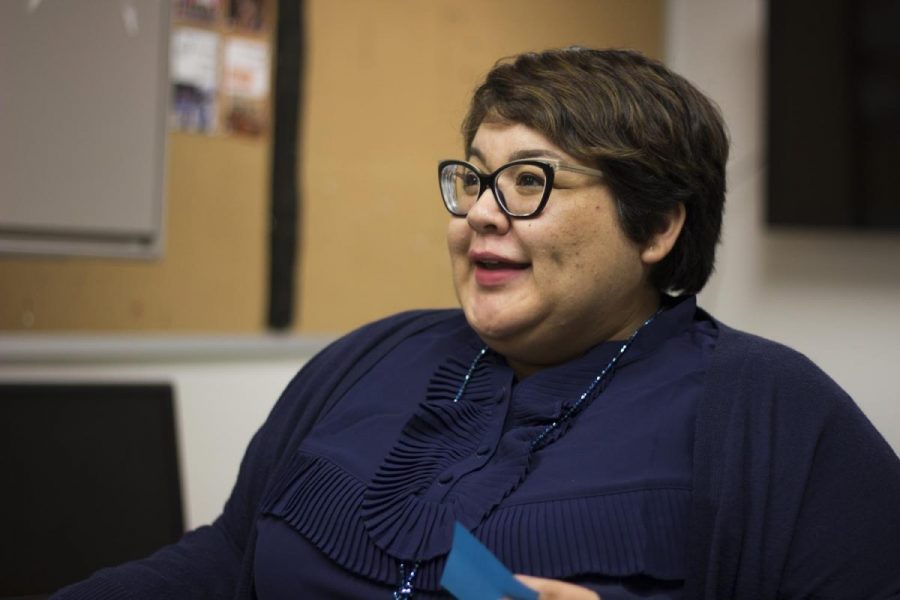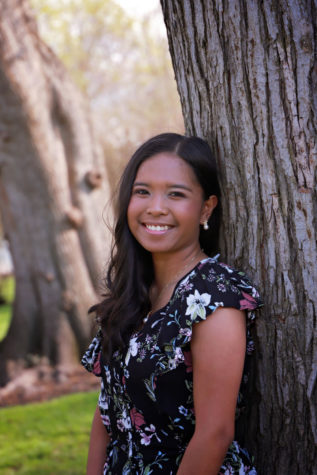Guide: Local resources change due to COVID-19
Resources include food pantry go bags, learning accommodations, academic counseling, tutoring, housing assistance for students
DARA EMAN | DAILY EVERGREEN FILE
Women*s Center Director Amy Sharp said the center supports underrepresented voices and encourages students in their learning.
August 16, 2020
The availability of resources for students on and off-campus changed slightly due to COVID-19. These resources include academic counseling, food assistance and housing support.
Office of the Dean of Students
Jill Creighton, dean of students and associate vice president of Student Affairs, said the Office of the Dean of Students can connect students to academic, financial, community standards, safety and health resources.
Students can call the office during its drop-in hours: 8 a.m. to 7 p.m. Monday through Thursday. The office will be open until 5 p.m. on Fridays.
Food pantry go bags are available for students as well, she said. This service is a partnership between the Office of the Dean of Students, the Women*s Center and the Office for Access and Opportunity. Students interested in using the service can fill out an online form or call the Office of the Dean of Students.
The form must be completed a day prior to the pick-up date to reserve a bag, according to the form. Bags contain different materials, including food, hygiene products and safe-sex supplies. The bags can be picked up from 10 a.m. to 1 p.m. Monday through Friday at the east side of the Lighty Student Services building.
Students can get additional assistance through the Office of the Dean of Students’ Student Care Network. Creighton said the network is a system-wide initiative that helps students overcome challenges through early intervention and connect them to appropriate resources.
“The Student Care Network is designed to be a place where you acknowledge that you need some support, but you’re not sure how to go about getting it,” she said.
Students struggling can make referrals for themselves through the Student Care Network’s online referral form. Faculty, staff and other individuals can make referrals as well, Creighton said.
“I think it’s so important for us to stay connected to each other socially, even though we might be physically distant,” she said. “The Coug experience does not end at the borders of campus or at the end of the Pullman city limits. The Coug experience is a lifelong thing.”
Academic Success and Career Center
Terese King, ASCC director and executive director of university advising, said the ASCC offers students both academic and career services. This includes academic and career advising. Advising drop-ins are available 2-4 p.m. Monday through Friday. The ASCC also offers academic coaching.
“That is for students struggling in a class, those who are looking for motivation in terms of getting their work done, or they’re having difficulty between the transition from high school to college-level courses,” she said.
Students can receive peer tutoring through the ASCC. Tutoring services for lower-division courses are free and will be conducted online this fall, King said.
Access Center Director Meredyth Goodwin said the center serves students with documented disabilities or medical conditions. The center works on providing accommodations to help students with their learning or living environments.
“We really focus on reducing barriers that students might experience,” she said, “and every student experiences different barriers, according to how their disability or medical condition impacts them.”
Testing accommodations are the most frequently requested service, King said. This includes time extensions during exams. ASCC also provides other services such as assisted technology and alternative print resources.
WSU Libraries Dean Jay Starratt said almost all their services will still be available online, despite the closure of WSU libraries on the Pullman campus this fall. These services include reference, reserves and instruction, as well as manuscripts, archives and special collections.
Starratt said a huge percentage of their books, journals and magazines are available digitally. Many libraries, including the WSU Libraries, have matched a significant percentage of their books to the HathiTrust Digital Library, giving students an opportunity to access those digital files.
Students can also receive library materials via mail. WSU Libraries can mail books to individuals along with a return envelope. Starratt said books will be continuously renewed this fall until they are returned. All returned materials will be quarantined for five days.
Students on the Pullman campus can also pick up their books through a locker pickup option, he said.
Women*s Center Director Amy Sharp said the center challenges patterns of injustice for all people of all genders. The center supports underrepresented voices and encourages students in their learning.
Because of COVID-19, the Women*s Center is redeveloping its mission on creating warm and inclusive spaces online.
“We’re still going to be really supportive,” Sharp said. “It’s just going to look different.”
She said the center’s Cougar Safe Rides service has changed. In the past, it operated on the weekends to give students a ride home. Cougar Safe Rides is now helping deliver foods to students through the Food Pantry Go Bags service.
This fall, the center will give students an opportunity to be involved in developing an online magazine where they can share their experiences, research and art. Interested individuals can learn more about this by contacting the center.
Multicultural Student Services
The MSS helps students of color with their overall undergraduate experience, MSS Director Stephen Bischoff said. It focuses on retention and assisting students with their transition to college. The MSS can also connect students to multicultural student groups.
Through the Multicultural Student Mentor Program, the MSS provides more than 60 student mentors to support incoming students, he said. The MSS also offers different types of programming throughout the year, including student involvement, professional development and cultural learning workshops.
“Even though we’re virtual, we are still passionate,” Bischoff said. “Our passion and desire to connect with students hasn’t changed.”
Jeff Tietjen, CAC senior housing coordinator, said the CAC provides different types of services, including food, housing and heating assistance. The CAC also offers weatherization services to help people prepare their homes for the wintertime. It also oversees various fair housing properties.
Students who fall behind on their rent can receive eviction prevention through the CAC, he said. Those who are looking for an apartment and need assistance with their deposits can receive some funding. The CAC has a program for homeless youth, who typically range from 18 to 24 years.
Lindsey Brocious, CAC energy assistance coordinator, said the CAC’s low-income home energy assistance program can help qualifying students pay for their heating bills.
Through Avista’s low-income rate assistance program, the CAC can help individuals pay up to $350 on their energy bill, according to the CAC’s website.
“I know there are some students who might be too nervous to call mom or dad and say ‘My power is going to be turned off.’ They wait and wait and wait,” Brocious said. “We’re really lucky when we run into those folks so we can help them right away.”
Eligibility information for these services can be found on the CAC’s website.










